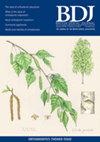‘It is relevant, it is useful and we won't be scared to ask': the response of undergraduate dental students to suicide awareness education
IF 2.3
4区 医学
Q2 DENTISTRY, ORAL SURGERY & MEDICINE
引用次数: 0
Abstract
Introduction There are over 6,000 deaths by suicide each year in the United Kingdom. National suicide prevention strategies seek to improve the way services assess those who are suicidal. It was highlighted that undergraduate dental students lack confidence when assessing individuals for suicide risk and there is an appetite for education on this topic. Aims To design, deliver and evaluate a brief teaching intervention on suicide awareness for undergraduate dental students using NHS Model for Improvement methodology. Methodology A scoping literature search found no formal framework or evaluation on suicide awareness teaching for undergraduate dental students. Following development and delivery of a pilot teaching intervention, an anonymised questionnaire was distributed with free-text boxes to capture qualitative feedback. Analysis informed subsequent improvement cycles and teaching. Results The vast majority of students felt the teaching was relevant, useful, and reported increased confidence and awareness of how to signpost following disclosures of suicidal ideation. Qualitative feedback was overall very positive, with the importance and universal impact of the topic highlighted. In total, 98% of students felt this topic should continue to be taught at undergraduate level and an appetite was expressed for further teaching. Conclusions There is strong support for further suicide awareness teaching at undergraduate level and scope for a unified approach to suicide prevention teaching in the United Kingdom. Consideration of the lived or living experience of those who have been affected by suicide, alongside input from national experts and charities, will be crucial in the development and delivery of this educational material.

“这是相关的,有用的,我们不会害怕问”:本科牙科学生对自杀意识教育的反应
英国每年有超过6000人死于自杀。国家自杀预防战略寻求改进服务机构评估有自杀倾向者的方式。研究强调,牙科本科学生在评估个人自杀风险时缺乏信心,因此有必要对这一主题进行教育。目的运用NHS模型改进方法,设计、实施和评估牙科本科学生自杀意识的简短教学干预。方法通过文献检索,未发现牙科本科学生自杀意识教学的正式框架或评价。在开发和交付试点教学干预措施后,分发了一份带有自由文本框的匿名问卷,以获取定性反馈。分析为随后的改进周期和教学提供了信息。结果绝大多数学生认为教学是相关的,有用的,并且报告说,在自杀意念披露后,如何指示路标的信心和意识增加了。总的来说,质量反馈非常积极,突出了该专题的重要性和普遍影响。总的来说,98%的学生认为这个主题应该在本科阶段继续教授,并且表达了进一步教学的意愿。结论:我们强烈支持在本科阶段进一步开展自杀意识教学,并为英国自杀预防教学提供统一的方法。考虑到那些受自杀影响的人的生活经历,以及来自国家专家和慈善机构的投入,对于编写和提供这种教育材料至关重要。
本文章由计算机程序翻译,如有差异,请以英文原文为准。
求助全文
约1分钟内获得全文
求助全文
来源期刊

British Dental Journal
医学-牙科与口腔外科
CiteScore
3.10
自引率
15.40%
发文量
1096
审稿时长
4-8 weeks
期刊介绍:
The role of the BDJ is to inform its readers of ideas, opinions, developments and key issues in dentistry - clinical, practical and scientific - stimulating interest, debate and discussion amongst dentists of all disciplines. All papers published in the BDJ are subject to rigorous peer review.
 求助内容:
求助内容: 应助结果提醒方式:
应助结果提醒方式:


